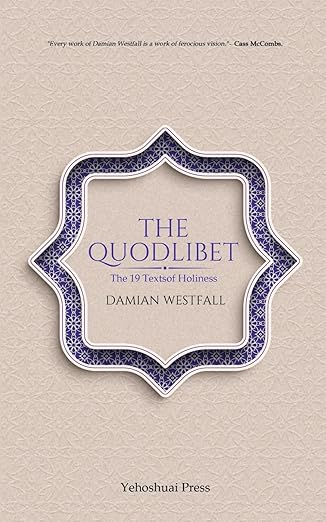What does it mean to live the faith we profess? For too long, Christianity has been reduced to words, labels, and empty rituals. Churches proclaim devotion to Christ while aligning themselves with politics of exclusion, hatred, and violence.
In his work The Quodlibet, Mr. Damian the Scrivener sets forth a radical reimagining of Christian faith, presenting the Yehoshuai vision: a call to humility, mercy, and radical service in the way of Christ. Complementing this, his collection Poems for Earth unites spiritual and ecological concerns, showing that to love God is also to love the world He made. These writings together invite readers to embody love not just in creed but in practice.
This vision comes alive in Text Nine of The Quodlibet: Wash the Feet of the World.
The Call to Radical Service
The title itself carries weight. To “wash the feet” is not a metaphor to be spiritualized away; it is a command to bend low, to take on the posture of Christ who knelt before his disciples and made service the measure of greatness. In the Yehoshuai Faith, this is no optional gesture—it is the very ethic that defines who belongs to Christ.
The world is bruised and bleeding, torn by arrogance, greed, and the lust for power. To wash its feet is to acknowledge its wounds and to act—not with sermons or slogans, but with humble service. It is the reversal of power, the stripping away of self-interest, and the decision to meet others in their suffering.
From Empty Words to Living Ethics
One of the central critiques in The Quodlibet is that mainstream Christianity has divorced belief from action. Faith, we are told, is enough. But the Epistle of James cries out: “Faith without works is dead.”
Text Nine insists that true discipleship cannot remain abstract. To love Christ is to embody his love in practice, feeding the hungry, welcoming the immigrant, healing the sick, standing beside the marginalized.
Here, love is not an idea but a lived ethic. Washing the feet of the world means refusing the path of domination and instead choosing mercy, empathy, and radical inclusion. It means that no person, whether rejected by church, family, or society, is beyond the reach of God’s love.
The Outcast as the Center
Mr. Damian the Scrivener makes clear that the Yehoshuai Faith is for the outcast: the LGBTQ+ believer shamed by the church, the immigrant treated as alien, the poor crushed by systems of greed. For them, The Quodlibet is not an abstract theology but a lifeline. Washing the feet of the world means placing these very people at the heart of faith, not at its margins.
To serve the outcast is not charity—it is alignment with the Christ who declared the poor, the meek, and the persecuted as blessed. It is to recognize that holiness is not found in cathedrals or pulpits, but in the act of bending down to cleanse the world’s wounds.
Transformation Through Love
Mr. Damian the Scrivener testifies that reading The Quodlibet aloud changes the reader, whether they believe or not. This is because the call to wash the feet of the world is more than a directive; it is an invitation to transformation. By practicing these ethics, the hardened heart is softened, despair gives way to hope, and torment finds release in the discipline of love.
The promise is clear: when we live out Christ’s ethics of service and humility, our own suffering is lifted not by escape from pain, but by the discovery that love redeems even in the midst of it.
Living the Quodlibet Today
“Wash the Feet of the World” is not a relic or a poetic phrase. It is a manifesto for living. In a time when Christianity is often associated with hypocrisy and division, this text calls us back to the radical path of Christ:
- To love without condition.
- To serve without pride.
- To embody humility in a world obsessed with power.
The Quodlibet insists that this is how torment ends, how suffering is relieved, and how the Kingdom of God breaks into the present.
To wash the feet of the world is to walk the path Christ walked, to live his ethics fully, and to proclaim not just with words, but with our very lives—that love is the law of God.



